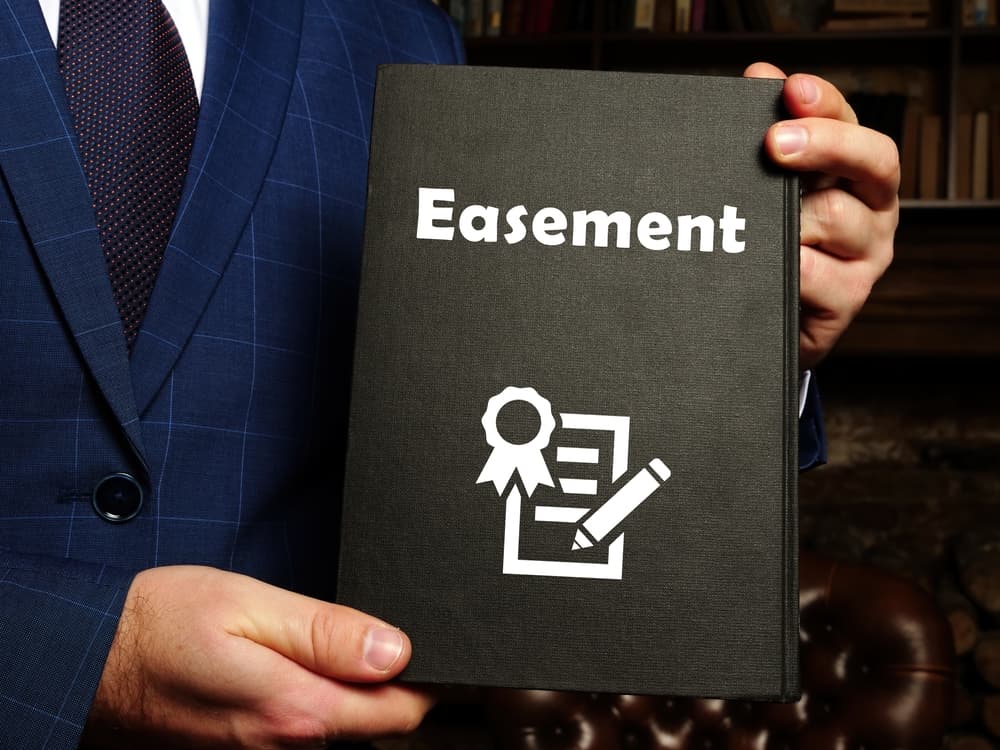Rights of Way and Easements

When you own property, you may be surprised that your rights to your own land are not always absolute. There are circumstances under which someone who does not own your land has a right to use it for certain purposes. You may have agreed to this arrangement, or their right to use the land may have existed before you owned the property. When someone else has the right to use part or all of your land, it is called an easement. The existence of an easement can have many ramifications for your ownership of the property. If you are the easement holder, your ability to continue using the land can also have serious impacts on either your own property or rights.
When it comes to an easement, you need to understand both your rights and obligations. You may be in a situation where you need to take action to enforce your rights, whether you are the property owner or the easement holder.
Regardless of which position you find yourself in, you need the help of a real estate attorney for various issues that relate to an easement. Whether you are in the transactional part of the process when you are negotiating an easement, or you are involved in a dispute relating to one, a real estate lawyer will provide you with invaluable counsel and advocacy. Any issues relating to the use of property can involve emotions, and they can be hard-fought. When you own property, your rights are understandably important to you. The same thing goes when you believe you have a right to use land. Get help from a easement lawyer for any issues relating to easements.
What Is an Easement?

An easement is the right that someone else has to use your land for a certain specified purpose. They may have received the permission through an agreement between them and you or a prior landowner. An easement can also be implied by the circumstances of a situation. For example, if one owns land that is locked without access to a major road, an easement will be implied by the situation because they will need a way to reach the road from their property.
An easement can apply to all or part of your land. For example, if there is a part of your land located between an adjacent landowner and a roadway, they may have the right to use that part of your land to reach the road. This type of easement will be called a right-of-way, which will give someone else, who does not own your land, the permission to use it.
Generally, an easement is a limited right to use land. It is not an ownership interest for the person who owns it. An easement is merely a permission to use part of the land.
Easements can be a burden on the landowner because they mean that you do not have the exclusive use of your own land. An easement can depress your property value and make it more difficult for you to sell your property. However, an easement does not always have to mean that the landowner suffers a financial loss. Nonetheless, it is vital that you are aware of all easements at the time that you purchase the property since they will affect the usage and value of your land.
What Are the Different Types of Easements?
There is no one singular type of easement on land. Instead, there are multiple potential easements that may come into play, including:
- Express easements – There is an explicit legal agreement between the property owner and the easement holder allowing their use of the land for a certain specified purpose.
- Prescriptive Easements – An adjoining landowner, or someone else, may have used the property in a certain manner over the years, and the law recognizes this type of easement as a matter of fairness and equity.
- Appurtenant Easements – Two people own adjoining land, and one needs to use the property of another to gain access to a road because their property is otherwise inaccessible. These easements pass to subsequent property owners when they purchase the land from the original owner.
- Easements in gross – Only the easement holder has the right to use the land, and the right terminates once the holder either dies or sells the land (in other words, the easement does not run with the land)
- Utility Easements – A utility company has the right to use the land to install things like wires or cables to provide service.
- Implied Easements – One may have the right to use the property of another, even when there is no express agreement, such as when they do not have access to a road from their property.
- Private Easements – A property owner has the right to create easement agreements with others, and it will be recorded as part of the property title. Only the person who was granted use of the land can hold this easement (For example, if one person is allowed to use a driveway on the property, it does not mean that the general public has this right)
Rights and Responsibilities Relating to Easements
When an easement exists, there is a dominant and servient estate. Each one has its own rights and responsibilities.
- Dominant Estate: Paradoxically, the holder of the easement is the dominant estate. They have the right to use the land due to their easement. They have a right to use the land, but only for the intended purpose of the easement. They cannot exceed the scope of the easement, or else they can owe damages or lose the right to lose the land entirely.
- Servient Estate: The servient estate is the landowner who must allow someone else to use their land. They may have given this right freely and through an agreement. The servient estate owner may not have had a choice in whether an easement existed, either because the easement was one of necessity or it ran with the land.
How to Learn About the Existence of an Easement
The prior owner will have a legal obligation to inform you about any easements before a real estate deal closes. You will need to have the ability to make an informed decision about whether you want to purchase the property, given the existence of the easement and how much you want to pay for it. However, you cannot always count on the prior owner to let you know about the easement. They may hide the fact because they want to sell the property, or they may not even know the easement’s existence themselves.
You will hire a real estate attorney before any deal closes or a title search agency to learn more about the property you are considering buying. The existence of the easement may show up in a title search, and you can learn about it that way. If the seller had not previously disclosed the easement to you, it is possible to either back out of the deal entirely or use the fact to reduce the purchase price.
You should also conduct your own visual inspection of the property to learn about the existence of any easements. Even if there is no public record of the easement, you may spot someone else using the land or other things that are evidence of an easement. You may be unable to come back after the deal has closed and sue the prior owner for not disclosing the easement if it had been readily apparent to you on a visual inspection. Courts show little inclination to grant relief to plaintiffs who could have detected a potential problem by doing their own due diligence and homework.
Limitations on Easements and Rights of Way
The easement holder does not have an unlimited right to use all of your land in any way that they want. Their usage of the land is limited to the scope of the easement, and they cannot exceed it, or else they risk losing the right to use your land entirely. For example, if the easement holder can use part of your property for a right of way to access a nearby road, they cannot use other parts of your property. They also cannot do anything else on that part of your property besides pass through it to reach the road.
For example, if the easement is for ingress and egress on your property, the easement holder will be unable to use a pond that is located on a different part of your property. If the easement holder is misusing their right, you can take legal action to either put a stop to the overuse entirely or to seek to end the easement. You can seek an injunction that may prevent the wrongful usage while the issue is being decided by the courts.
What to Do As a Property Owner
If you own property, it is essential that you actively exercise your own rights. If someone else is using your property without permission, you must take some sort of action to let them know that it is unacceptable. Otherwise, another party may establish the right to use your property over time, even if you do not have permission.
Each state has a law that favors the use of property. If someone adversely uses your land without permission for a certain period of time, and the property owner does not object, their right could become recognized by law. They can go to court to establish their own rights, or they can successfully defend against a lawsuit that seeks to prohibit their use of the land.
If you are involved in a dispute over the use of your land, it may become necessary to go to court to file an action to quiet title. Here, you will be asking a judge to rule on any prospective rights that someone else may have to your land, and the court can declare your rights over your own property. If you wait too long to take action, it can be read as your waiver of your own property rights.
What to Do as an Easement Holder
When you hold an easement, you have the right to use the land. So long as you are using the easement in accordance with its terms, the property owner cannot interfere with your right to use the land. If they are not allowing you to use the property, you can sue them for damages. If the property owner is interfering with your rights, it is essential that you bring it to their attention so you can attempt to resolve the dispute. If you cannot reach an agreement, you will need to take the matter to court.
How a Real Estate Lawyer Can Help You

You may need a real estate attorney to help you deal with many potential issues involving easements. A real estate attorney can do the following for you:
- Assist you in the transactional process when you are negotiating an easement, either as the user of the property or the owner
- Negotiating or litigating to modify or terminate an existing easement
- Represent you in resolving any disputes that pertain to the existence or use of the easement
- Seeking damages on your behalf when the use of an easement has harmed you, or you are the one who has been wrongfully denied the use of land
A Real Estate Attorney is Standing By
Deciphering easements is not easy. You want to be clear about an easement on a property you own or may consider purchasing. You should engage a real estate lawyer any time there is an issue relating to an easement. You should hire them early in the process so you can potentially resolve the dispute without the need for a lawsuit.
A Seattle real estate law firm can help you engage with the other party’s attorney in the hopes of reaching a resolution. If you cannot reach an agreement, your real estate lawyer will take your case to court. You can seek an injunction or damages to address the harm that you have suffered.



